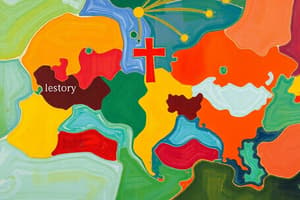Podcast
Questions and Answers
What characterized Europe during the feudalism period?
What characterized Europe during the feudalism period?
Political power divided among local lords and the central monarch
What were the significant events during the feudalism period?
What were the significant events during the feudalism period?
The Crusades and The Black Death
When did modern history begin?
When did modern history begin?
Renaissance in the 14th century
What were some key events during modern history?
What were some key events during modern history?
Why is history important?
Why is history important?
Flashcards are hidden until you start studying
Study Notes
History
History is the study of past events, particularly human history, including the culture, society, politics, and economics of different regions and time periods. It involves interpreting past events based on available evidence, such as written records, artifacts, and other historical documents.
The earliest known examples of recorded history date back to ancient Mesopotamia around 3500 BC. Over time, history has been documented and studied by people from various cultures and civilizations.
Major Historical Periods
Ancient History
Ancient history encompasses the time period from the earliest recorded civilizations, such as Sumer and Egypt, to the fall of the Western Roman Empire in 476 AD. During this time, significant developments occurred in agriculture, writing, and building. Some notable ancient civilizations include:
- Sumer: One of the earliest civilizations, located in the southern region of Mesopotamia.
- Ancient Egypt: A civilization known for its pyramids, pharaohs, and hieroglyphics.
- Ancient Greece: A civilization that contributed significantly to Western philosophy, politics, and literature.
- Ancient Rome: A civilization that developed many legal and political institutions that are still used in the Western world today.
Medieval History
Medieval history covers the time period from the fall of the Western Roman Empire in 476 AD to the Renaissance in the 14th century. During this time, Europe was characterized by feudalism, where political power was divided among local lords and the central monarch. Some significant events during this period include:
- The Crusades: A series of religious wars sanctioned by the Catholic Church in the 11th and 12th centuries.
- The Black Death: A devastating pandemic that swept through Europe in the 14th century, killing an estimated 75-200 million people.
Modern History
Modern history spans from the Renaissance in the 14th century to the present day. This period is marked by significant advancements in science, technology, and politics. Some key events and developments during this time include:
- The Scientific Revolution: A period of intellectual and scientific advancements that began in the 16th century.
- The Industrial Revolution: A period of rapid industrial growth that began in the late 18th century and lasted until the mid-19th century.
- World War I and II: Two major global conflicts that had profound impacts on the world.
Importance of History
History is important for several reasons:
- Understanding the Past: It helps us understand where we came from and how the world has evolved over time.
- Cultural Awareness: Studying history allows us to appreciate the diversity of human cultures and societies.
- Personal Development: Understanding history can help us develop critical thinking and problem-solving skills.
- Political Stability: Knowledge of history can help us make informed decisions about our future and maintain political stability.
In conclusion, history is a vital field of study that enables us to understand our past, appreciate cultural diversity, develop critical thinking skills, and make informed decisions about our future.
Studying That Suits You
Use AI to generate personalized quizzes and flashcards to suit your learning preferences.



